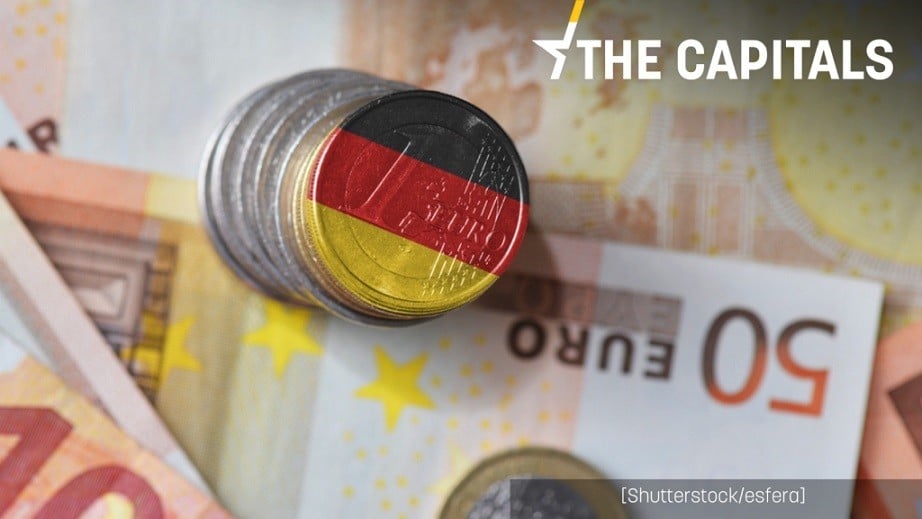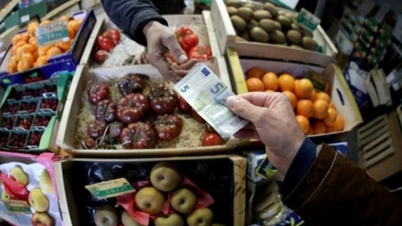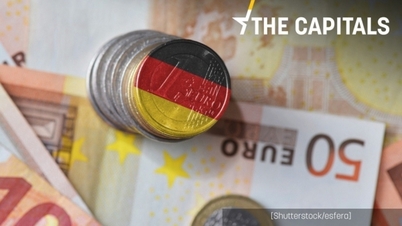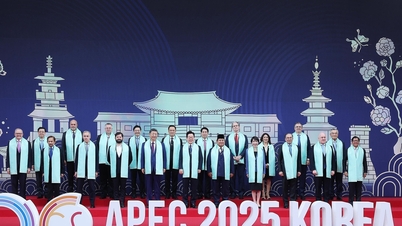 |
| The German economy is already in recession, and there are more risks. The more the European 'locomotive' separates itself from China, the more dependent it becomes. (Source: Shutterstock/esfera) |
For many years, Germany has always been considered the economic locomotive of Europe and has overcome crises many times spectacularly, even "carrying the team" and supporting some weak economies of the European Union during recessions.
Therefore, when Europe's number one economy and also the world's fourth largest economy officially fell into recession with negative growth for two consecutive quarters (quarter 4/2022 and quarter 1/2023), it made the business community extremely worried.
An exodus is about to begin?
A study by the German Business Federation (BDI) shows that more and more businesses are moving jobs and production abroad, while many others are considering taking specific measures, as concerns about the German economy continue to grow.
Of the companies included in BDI's study, 16% of mid-sized companies have already begun moving parts of their business, and another 30% are considering doing so, the study found.
BDI President Siegfried Russwurm said that nearly two-thirds of the companies they interviewed considered energy and resource prices to be one of the most pressing challenges. “Electricity prices for businesses must fall reliably and sustainably to competitive levels, otherwise the [green] transition of businesses will fail,” he said.
Similar concerns arose after the US introduced the $500 billion Inflation Reduction Act (IRA), which provides generous subsidies for the green industry. In response to the IRA and rising energy prices, electric car giant Tesla scrapped some of its ambitious plans, including building its largest battery factory near Berlin, and announced it would focus on the US market.
Concerns about the German economy and its global competitiveness have also emerged recently, with the European Commission predicting last month that the country will be among the eurozone's slowest-growing economies by 2023, with high energy costs and the EU's carbon price repeatedly cited as weakening the business environment.
Tighten cooperation with China
Despite calls to diversify economic relations, Germany's dependence on the Chinese economy, especially imports from China, continues to grow.
A study by the German Economic Institute (IW) shows that, over the past several months, although the German government has called on the country's economic sectors to actively diversify economic relations to reduce dependence on one country, the IW's research results show the opposite.
Germany is increasingly importing more goods and products from China and is therefore increasingly dependent on the world's second largest economy.
In 2022, among the groups of goods produced in Germany, components and raw materials imported from China accounted for more than half of the total import volume. Up to more than 70% of the total German groups continued to increase imports from China.
For example, 87% of all laptop imports into Germany in 2022 came from the Asian country (up from 84% in 2021). Magnesium metal, used in robotics and 3D printing, imports from China increased from 59% in 2021 to 81% in 2022; some iron products also increased from 74% to 85%.
The problem pointed out by the author of this study - expert Jürgen Matthes, is that not all products with a large Chinese market share are essential and difficult to replace, for example, electric blankets and electric mattresses (China's market share is 84%). In fact, these products can be completely switched to other suppliers in a short time.
Of course, many other products, such as some chemical materials and electronic components, Germany has indeed become dependent on China for supply. Magnesium and some rare earths are prime examples.
The German industry association (BDI) has repeatedly pointed out this heavy dependence. A recent BDI analysis showed that imports from China of some raw materials such as rare earths, used to make electric batteries, accounted for more than 90% of Germany's total imports of these materials.
While they are not as rare as they sound, they are expensive to mine and are highly environmentally damaging, making it difficult in the short term to replace supplies from China with supplies from other countries. Many other important raw materials are in a similar situation.
Expert Matthes commented that diversifying supply sources and eliminating the risk of dependence on China is almost not happening on a large scale.
Disadvantage belongs to Berlin?
On the contrary, dependence on Beijing is growing for many products and goods. The more China “dominates the world” in any type of goods, the harder it is to find alternative suppliers.
A recent study by Germany’s Kiel Institute for the World Economy (IfW) also showed similar results. Accordingly, the global dominance of China and Taiwan (China), especially in electronic products, combined with Germany’s dependence on these products, brings great risks to Europe’s leading economy.
In trade in general, the situation is similar, relations are increasingly shifting against Germany. In 2022, China was Germany's largest trading partner for the seventh consecutive time.
According to data from the Federal Statistical Office, the proportion of goods that Germany imports from China accounts for 12.8% of the total volume of imported goods in Germany. This figure is very remarkable, showing the great dependence of Europe's leading economy on the supply of goods from China.
In recent years, the amount of German goods imported from China has been increasing year by year. But in the export sector, the opposite is true, the amount of German goods exported to China is decreasing.
In 2022, China will only be fourth in the list of Germany's largest sales markets. The top three positions will be held by the United States, France and the Netherlands. Research experts warn that the German-Chinese trade relationship is becoming increasingly unequal, to Berlin's disadvantage. If in 2010, Germany's trade deficit with China was 23.5 billion euros ($25.7 billion), in 2022, this figure will reach 84.1 billion euros.
Compared with other European countries, the German economy is also heavily dependent on China for investment. For many years, German companies have invested a large amount of capital in this market. German investors have been among the five largest European investors in China in recent years.
Several German companies have been doing a large part of their production and business in the Asian country for years. Semiconductor company Infineon, for example, generates more than a third of its total revenue from the Chinese market. German carmakers such as VW, Mercedes and BMW also rely heavily on sales in the Chinese market.
German companies are increasingly keen to invest in the world's second-largest economy. An analysis by IW has shown that, despite geopolitical tensions, German companies invested more directly in China in 2022 than ever before, with a total of 11.5 billion euros.
However, in reality, despite its great dependence on China, for Germany, the European Union (EU) countries and the US are still the most important trading partners, even though Beijing is the largest trading partner.
According to a joint study by the German Industry Association (BDI), the Bertelsmann Foundation, the Merics Institute for China Studies and IW, EU countries ranked first in the list of countries with the largest number of employees, sales and the largest share of German subsidiaries. The US ranked second, while China ranked third.
The study found that more than 40,000 German companies operate abroad, employing nearly 8 million people and generating annual revenues of nearly 3,100 billion euros, of which only a "relatively moderate" share is active in China. The destination of most direct investments by German companies is not the world's second largest economy, but mainly the EU countries and the US.
The study also found that the proportion of German direct investment in China that comes from the profits generated by German companies in China has been on the rise. From 2018 to 2021, all of Germany's direct investment in China came from these profits.
Experts believe that with the desire to continue cooperation as the goal of the German-Chinese intergovernmental consultation affirmed, the two countries' economies will continue to be more closely linked in the coming time.
Source



![[Photo] Lam Dong: Images of damage after a suspected lake burst in Tuy Phong](https://vphoto.vietnam.vn/thumb/1200x675/vietnam/resource/IMAGE/2025/11/02/1762078736805_8e7f5424f473782d2162-5118-jpg.webp)


![[Photo] President Luong Cuong receives US Secretary of War Pete Hegseth](https://vphoto.vietnam.vn/thumb/1200x675/vietnam/resource/IMAGE/2025/11/02/1762089839868_ndo_br_1-jpg.webp)








































































































Comment (0)